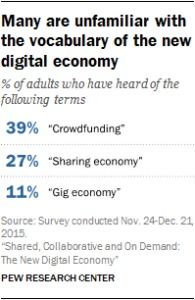I’m curious if readers of this blog, futurists or otherwise, were as surprised as I was to see the Pew Research Center report last month about how, to the average American, some of the biggest digital economy companies and concepts are still relatively unknown. A few highlights:
- 61% of Americans have never heard of the term “crowdfunding.”
- 73% are not familiar with the term “sharing economy.”
- 89% are not familiar with the term “gig economy.”
This was a reminder to me that the digital economy is still far from mainstream, and I think we need to keep that in mind when we analyze new technologies. But there’s another reason the report caught my eye, which is that it I think it’s another good example of a human ecosystem, in this case the digital economy, exhibiting signs of Postnormal Times (PNT). The digital economy is famous for making our lives easier, cutting out various middlemen and red tape to get what the consumer actually wants: a bed, not a grand lobby, a ride, not a car. This seems very normal in terms of the evolution of consumer needs.
But according to Sardar and Sweeney, “many ‘normal’ systems will not continue to operate ‘normally’ in PNT—sooner or later, the 3Cs will have a direct or indirect impact on them.” It may sound somewhat doomsday, but it’s not. PNT is nothing to fear, but a way of observing the world; evidence of the 3Cs are just indicators that a system is evolving and changing, and lets us know that our responses need to change in kind.
One of those Cs stands for “contradictions.” Though contradiction is of course ‘normal,’ the contradiction between the relatively small slice of consumers being served by Uber and AirBNB doesn’t mesh with the massive values (AirBNB worth $30Billion) associated with such startups. This is where my PNT radar goes off.
Here’s another set of interesting facts that show how low actual consumer engagement with the digital economy services actually looks:
- 6% of Americans have ordered groceries online from a local store and had them delivered to their home (Instacart, Peapod or Fresh Direct).
- 4% have hired someone online to do a task or errand (TaskRabbit, Fiverr or Amazon Mechanical Turk).
- 2% have rented clothing or other products for a short period of time online (sites like Rent the Runway).
The digital economy is still maturing, and certain aspects of it (Craigslist, Ebay) are widespread. But I think this contradiction between the high value of the startups and low familiarity with these services is worth considering as a signal of the postnormal, which means being prepared to explore new worldviews that can better meet the need of the modern digital consumer.
